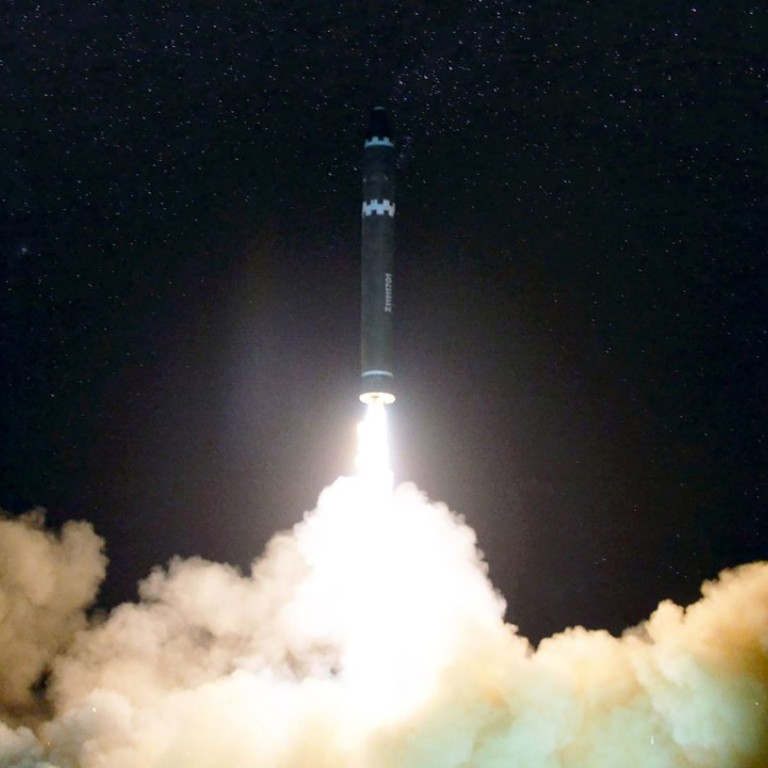
US ambassador to UN urges harder line on North Korea amid reported new missile test plan
Nikki Haley said ‘North Korea can talk with anyone they want, but US is not going to recognise it until they agree to ban nuclear weapons that they have’
Washington’s Ambassador to the United Nations Nikki Haley dismissed the utility of possible direct talks between North and South Korea, warning that a harder line is necessary in light of reports that Pyongyang might be preparing for more ballistic missile tests.
“North Korea can talk with anyone they want, but the US is not going to recognise it or acknowledge it until they agree to ban the nuclear weapons that they have. We won’t take any of the talks seriously if they don’t do something to ban all nuclear weapons in North Korea,” Haley said.
The US envoy to the UN was referring to comments by South Korea’s unification minister Cho Myoung-gyon, who said Seoul was “reiterating our willingness to hold talks with the North at any time and place in any form”. South Korea proposed holding high-level talks with Pyongyang, after the North’s leader, Kim Jong-un, said Pyongyang might attend the Winter Olympics.
“There is more to do to ensure full implementation of the [UN] Security Council resolutions as we hear reports that North Korea might be preparing for another missile test,” Haley said. “I hope that does not happen but if it does we must bring even more measures to bear on the North Korean regime.”
Any breakthroughs in relations between Seoul and Pyongyang could weaken the united front South Korea, Japan and the US had forged since North Korea began ramping up its testing of ballistic missiles capable of reaching mainland US cities and underground nuclear tests.
That unity helped the allies secure Security Council approval of three new sets of sanctions last year, virtually cutting North Korea’s access to raw materials and export revenues.
South Korea had echoed demands by the US and Japan for a complete, verifiable and irreversible dismantling of Pyongyang’s nuclear weapons programme. However, South Korean President Moon Jae-in’s concern over security during the upcoming Olympic Games appears to be complicating the allies’ strategy.
Kim Jong-un “wants to unwind sanctions and clearly sees President Moon’s angst over the Olympics as the weak link in the allied chain”, Daniel Russel, the top US diplomat for East Asia until last April and now senior fellow at the Asia Society Policy Institute, said via the think tank’s Twitter handle.
Haley made her comments just hours after US President Donald Trump also played down the need for direct talks between the two countries, which have technically been at war since 1950.
“Sanctions and ‘other’ pressures are beginning to have a big impact on North Korea. Soldiers are dangerously fleeing to South Korea. Rocket man now wants to talk to South Korea for first time,” Trump said on Twitter. “Perhaps that is good news, perhaps not – we will see!”
“We hope that the South and North can sit face-to-face and discuss the participation of the North Korean delegation at the Pyeongchang Games as well as other issues of mutual interest for the improvement of inter-Korean ties,” Cho said at a press conference.
The prospect of direct Seoul-Pyongyang talks has raised concern among other analysts that such moves would undermine efforts by the Security Council to cut off trade ties that have supported North Korea’s nuclear weapons programme.
![“There is more to do to ensure full implementation of the [UN] Security Council resolutions as we hear reports that North Korea might be preparing for another missile test,” US Ambassador to the UN Nikki Haley said. Photo: AFP](https://cdn3.i-scmp.com/sites/default/files/images/methode/2018/01/03/1e1c04ea-eff3-11e7-bd43-e13d2822bb61_1320x770_111727.jpg)
“Moon wants to host a peaceful 2018 Winter Olympic Games, as well as open direct dialogue with his neighbour,” Scott Snyder, senior fellow for Korea studies and director of the programme on US-Korea policy at the New York-based Council on Foreign Relations, said in an opinion piece written for The Atlantic.
“But in pursuing those things, Moon cannot succumb to North Korean nuclear blackmail to weaken the South’s military alliance with the United States – in the very same New Year’s speech, Kim claimed to be able to hit the US with a nuclear weapon.”
“Nor can Moon abandon the US-led international pressure campaign against North Korea’s nuclear and missile development,” Snyder said.
South Korea has been trying for months to secure Pyongyang’s participation in the Pyeongchang Games.
“Although North Korea hasn’t given an official response yet, we are very hopeful that they will compete. For them to participate is a sign that we’ll have safe and secure and good Games,” Do Jong-hwan, South Korea’s minister of culture, sports and tourism, said at an event organised by the New York-based Korea Society in November.
“I hope that the Games will help lay the foundation for dialogue and cooperation on the Korean Peninsula, which is going through political tension,” said Do, adding that North Korea’s participation in the Pyeongchang Games is likely to be “a last-minute decision”.
North Korean figure skaters Ryom Tae-ok and Kim Ju-sik qualified for the 2018 Winter Games at an International Skating Union competition in Oberstdorf, Germany in September. The pair’s participation in the Games is now up to the North Korean Olympic committee.
The Pyeongchang Games will take place just 80km from South Korea’s heavily fortified border with its estranged neighbour to the north. The mountainous resort town will host the largest Winter Games yet in terms of participants and events.

